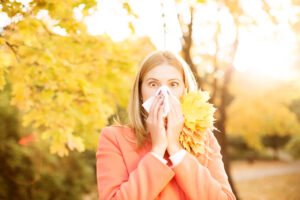When it comes to the spring season, most of us welcome the warmer days and the sight of flowers blooming. However, this time of the year can be challenging for 1 in 5 Australians including adults and children who have hay fever and/or asthma. Hay fever usually begins in September and last through December or all year for some people. The common allergens are pollen, dust mites, mould, pollution or skin flakes and saliva shed by dogs, cats or other animals with fur or feathers.
The common cold and hay fever are often confused as they share common symptoms such as a runny, itchy and blocked nose. Hay fever symptoms can last for weeks to months and may also include an itchy throat and watery and itchy eye. Thankfully, it is not contagious like the common cold.
Addressing hay fever early in the season can help reduce your allergic response and the risk of complications such as a persistent blocked nose, sinus infection or an asthma flare up.
Here are some steps to take to help you win the hay fever battle:
DO
- Download the Sydney Pollen Count app or a pollen app available for your city
- Use a saline rinse daily to wash out all the pollen in your nose
- Shower and change out of your clothes that have been worn outside
- Keep windows and doors closed when pollen count is high
- Use re-circulated air in your car when pollen count is high
- Wear wrap-around sunglasses
- Vacuum regularly and dust with a damp cloth
- Keep pets outdoors or if kept indoors, wash them regularly to remove pollen from their fur
- Use a HEPA filter in your home
AVOID
- Keeping fresh flowers in your home
- Drying clothes outside on days when the pollen count is high
- Spending time outdoors when pollen count is high
- Cutting grass if you are allergic to it (or wear a mask if you have to cut grass)
- Spending time outside early in the morning or before midday when pollen count is high
Hay fever may not always be avoidable but it can be well controlled by taking these steps. Let the spring season memories of hay fever fade and remember it for its clear skies, colourful flowers and warmer weather.



